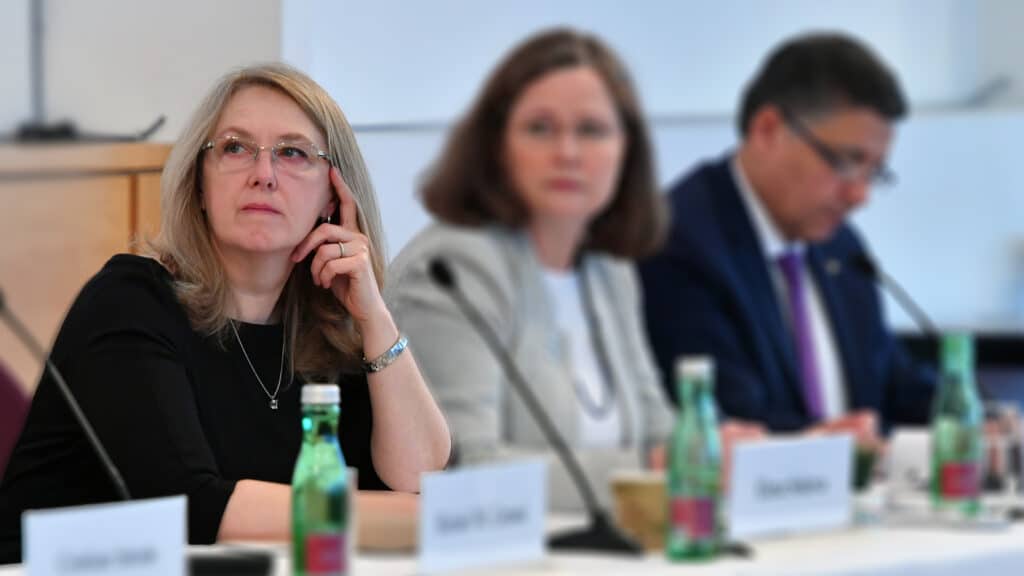The Post-pandemic reality for employees in the nuclear industry

Author – Callum Thomas
At Thomas Thor, we speak with thousands of people either looking for career moves within the nuclear sector or interested in moving to nuclear from another industry. These conversations allow us to hear first-hand from employees about their motivations and preferences, as well as hearing from employers about how they are adapting to the changes in the way work is delivered and the needs of employees.
‘’The Great Resignation’’ is being written about a lot these days as statistics show that unprecedented numbers of people are either resigning or planning to resign in the near future. Is this happening in the nuclear industry as well? The short answer is yes, although not as severely as other industries such as tech and healthcare. The highest staff turnover is happening to people in the midst of their careers. Employees in this demographic are generally hungry for career advancement and experienced enough to join a new team while working remotely. Our experience tells us that people leave a job because they are unsatisfied with their team or their manager, as opposed to not being satisfied with the whole organization. In many cases the experience for employees in a team has not reflected the wider company policies on flexibility and accommodations during the pandemic. People are often moving jobs in greater numbers because they think that there are better working conditions elsewhere, as well as sensing the opportunity for career advancement.
For most employees in the nuclear industry, the last 18 months have offered plenty of time for reflection. Even those with busy site-based roles have experienced changes in the dynamic of the working environment. These changes, especially for those working from home, have sparked dormant thoughts about purpose and values, which have caused people to revaluate their career plans. Employees seem to be keener on tuning their work to their values, which can be achieved by joining an organization with a clear purpose, mission and vision. Nuclear energy can present a huge opportunity in terms of attracting new employees with NetZero aspirations. We are sensing an increase in pride amongst those already working in the industry as well as an increase in interest in joining the nuclear industry for its clean energy credentials.
Flexibility, especially hybrid working, is now a base expectation of those working in the nuclear sector, not a trade off against salary or other conditions. This is true for site-based employees as well as those with job roles that lend themselves more naturally to flexible working (note that flexibility means much more than just remote working). However, many people in senior leadership roles retain a historical perspective that flexible working is a ‘’perk’’, but in the eyes of most employees it is seen as a right. Amongst those looking to move to a new role one of the most common reasons is that they perceive other organizations to be more flexible.
In the last two years, the appetite for very long commute or international assignments has waned for fear of being separated from family and friends for extended periods of time. Weekly or monthly commuting has been very challenging for many people, often involved in major projects. A significant portion of major projects professionals have not worked during the pandemic and are now very eager to return to working. We are noticing a marked increase in the number of people interested in international relocation for project work and more flexibility in terms of pay and location.
The degree of flexibility offered by employers is not ‘one size fits all’, even within the same organization. Often, companies will have high level guidance policies but individual team managers generally set the environment and expectations within their teams. This results in wildly varied experiences for employees depending on the demeanor of their managers and peers. This delegation of day-to-day responsibility to team managers produces mixed outcomes. Managers with strong empathy and adaptability skills thrive as they can organize their teams to deliver objectives while simultaneously accommodating the flexibility that employees want. Meanwhile more controlling managers with the attitude that flexibility is ‘’earned’’ are struggling, as their teams feel like they are not afforded the same flexibility as others. This rigidity can explain why an exodus to more accommodating teams is occurring. Successful employers are reacting by providing training and development to managers at all levels in areas such as empathy, communication and managing by outcome rather than by visible input.
Alternatively, some organizations are hiring for roles that can be done remotely indefinitely such as finance. The big benefactors in the nuclear industry are organizations in remote locations that have a newfound enthusiasm for flexible working and are hiring people to work from home wherever they live in. This is not a new phenomenon as there were some examples of very successful remote organizations before the pandemic. Progressive organizations in nuclear are seizing the opportunity, but many are not because they have not afforded flexibility to their existing employees and therefore cannot easily start offering it to new employees.
There is a general theme in the nuclear industry across Europe and North America of managers wanting their team members back in the office, which is frustrating employees that don’t want to let go of their newfound flexibility. This is a product of disconnect between senior leadership endorsement of flexible working and the reality within teams, driven by the reticence or lack of ability in team managers to effectively manage distributed teams.
There will be winners and losers across the employers in the global nuclear industry following the pandemic and the Great Resignation. Those that get the flexibility right for employees will retain more employees and attract better talent. Those that don’t will lose people and struggle to attract new employees. To build the sustained effort necessary to manage teams in a hybrid working environment, leaders will need support to develop these newly required skills.
Share this article
Related articles
Help us grow and achieve your potential at a values-driven business.




